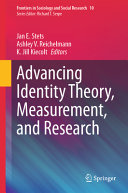

Most ebook files are in PDF format, so you can easily read them using various software such as Foxit Reader or directly on the Google Chrome browser.
Some ebook files are released by publishers in other formats such as .awz, .mobi, .epub, .fb2, etc. You may need to install specific software to read these formats on mobile/PC, such as Calibre.
Please read the tutorial at this link: https://ebookbell.com/faq
We offer FREE conversion to the popular formats you request; however, this may take some time. Therefore, right after payment, please email us, and we will try to provide the service as quickly as possible.
For some exceptional file formats or broken links (if any), please refrain from opening any disputes. Instead, email us first, and we will try to assist within a maximum of 6 hours.
EbookBell Team

5.0
20 reviewsThis volume presents recent advances in identity theory, which is a prominent and active theory in sociological social psychology and a versatile framework for explaining the sources of identities, how they develop, how they operate in situations and groups, and how they influence behavior and well-being. The volume is organized around new theoretical developments, measurement techniques, and research in the field. Theoretical developments covered in the volume sharpen, reframe, and expand fundamental concepts in identity theory. State-of-the-art techniques for measuring identities assess, refine, and update existing measures. New research in the volume addresses both individual processes and outcomes and group processes and outcomes. The chapters together showcase the wide applicability of identity theory to a host of identities, such as the religious, gender, sexual, physical attractiveness, racial/ethnic, parent, student, partisan, and group member identities. The volume editors introduce identity theory and provide an overview of the chapters. In the last chapter, they describe how this volume points to future directions for advancing theory, measurement, and research in identity theory.
This volume is of interest to a wider readership, including sociological social psychologists, sociologists, and scholars in other disciplines (psychology, political science, economics, education) whose research or teaching deals with identities. Graduate and advanced undergraduate students interested in identity research will also find this book accessible. Finally, this is for discerning laypersons who are interested in how identities influence and shape their lives and affect their well-being.